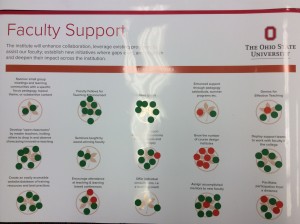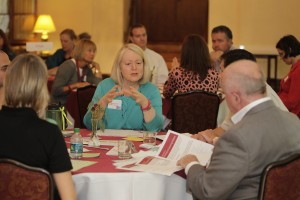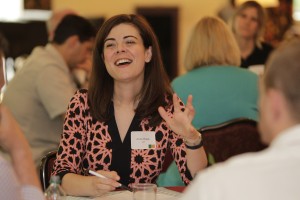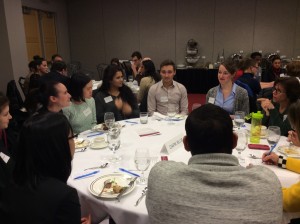At the March 25th convening of the faculty advisory council there was a strong focus on the new faculty development program proposal. The Council recommended that new faculty need to focus most on 1) Understanding how to effectively incorporate the range of tools and support available to enhance their teaching 2) To connect to active, cross-disciplinary teaching communities at OSU and within their cohort and 3) Take a scholarly approach to their teaching. The committee recommended the initial kickoff of the program be between 4 and 6 hours and an expectation of 15-24 hours of average participation over the course of the year. The Institute should ensure that there is a wide mix of activities and a strong role of mentoring.
Author: Jennifer Cowley
Regional campus students offer recommendations for faculty development
On Friday January 29th, eight students from across the regional campuses came together to discuss the proposed Teaching and Learning Institute. Students offered insights on their best learning experiences. They then shared their thoughts on how faculty could best help them learn. Students emphasized the importance of a connection with their faculty member and how an individual note of encouragement can foster interest and inquiry. Students encouraged faculty to use Carmen consistently, allowing students to have a one-stop location for class materials. Regional campus students emphasized the importance of faculty members demonstrating their enthusiasm for the subject, which sparks their own interest. Students at all of the OSU campuses emphasized the importance of hands-on experiences in enhancing their learning.
Advisors offer suggestions for teaching and learning institute
On Friday January 29th, a focus group of advisors from across the University came together to offer feedback on how faculty can continue to develop and foster the success of students. Advisors are on the front line hearing from students about their best learning experiences and when they struggle. Advisors offered helpful tips that can benefit new and existing faculty. For example, making sure that office hours are posted and that faculty communicate and encourage students to take advantage of those office hours. Advisors noted the importance of students sensing a connection with faculty members. They also emphasized the importance of early alerts when students are struggling, encouraging faculty to reach out to students who may need extra help.
Students Offer Advice on Institute
On January 21st, approximately 50 students from across the University came together to discuss the proposed Teaching and Learning Institute. Students offered insights on their best learning experiences. They then shared their thoughts on how faculty could best help them learn. The insights from the students will be used to continue to revise the institute proposal.
January Teaching and Learning Convening
At the January 15th Teaching and Learning Initiative convening the faculty advisory committee came together to review and revise the draft institute proposal. The faculty advisors identified the strengths and weaknesses of the proposal and offered revisions.
Participants also responded to an initial concept for a faculty development activity, developed by the University Center for the Advancement of Teaching and the Office of Distance Education and E-Learning. Learn about the Concept for New Faculty Development.
Throughout the month of January there will be engagement with students, advisors, graduate teaching associates, and department chairs to gain their insight and thoughts on the institute proposal.
November Teaching Initiative Convening
The November convening focused on reviewing feedback from units across the campus to the draft institute proposal. There was significant participation from units across the campus, with significant interest, thoughts, and opinions about where and how teaching resources should improve across the University. A key point of discussion is about the array of teaching and learning related centers, programs, and resources. Do we need a whole new institute or should we be enhancing the centers/offices we already have? How would any institute be able to integrate these other activities? How can we make teaching and learning resources more visible and accessible? There were a number of questions around how the institute might define or support evidence-based metrics of successful teaching and learning?
Key units on campus engaged in supporting teaching and learning presented the work they do to support the university’s faculty. Several presenters provided presentation materials for sharing, included below:
University Center for the Advancement of Teaching
Office of Distance Education and eLearning
Center for Higher Education Enterprise
Center for Life Sciences Education
Department of Engineering Education
School of Teaching and Learning
This was followed by a discussion of the potential organizational structure of the institute, with small groups brainstorming how the institute could be organized. Debating whether it should be a virtual or physical institute and how the institute might be governed. There was a strong interest in having a proactive institute open to everyone, serving as a clearinghouse for teaching and learning resources. There was interest in a non-traditional institute structure, where leadership could rotate, be delivered in a distributed model, and/or integrate services across the institution.
 The last activity was to consider which of the many commonly suggested activities of the potential institute would be most important to pursue in the first year of the institute. A key initiative would be to communicate the identity of the institute. While the institute is still in the formative stage, it will be essential to have a clear identity for the institute. For example, in the area of faculty support there was strong interest in creating an “open classroom” program where master teachers invite others to drop in and observe, creating a showcase for innovative and effective teaching. Under inquiry and scholarship, there is strong support for creating a teaching and learning grants clearinghouse. In policy development there was strong interest, but also concern around how we create more substantive evaluation of teaching performance in the annual review process.
The last activity was to consider which of the many commonly suggested activities of the potential institute would be most important to pursue in the first year of the institute. A key initiative would be to communicate the identity of the institute. While the institute is still in the formative stage, it will be essential to have a clear identity for the institute. For example, in the area of faculty support there was strong interest in creating an “open classroom” program where master teachers invite others to drop in and observe, creating a showcase for innovative and effective teaching. Under inquiry and scholarship, there is strong support for creating a teaching and learning grants clearinghouse. In policy development there was strong interest, but also concern around how we create more substantive evaluation of teaching performance in the annual review process.
The results of the convening will support continued revisions to the proposal in advance of the advisory council’s next meeting on January 15th.
October Teaching Initiative Convening
 The meeting began with those attending sharing/discussing examples of articles related to pedagogy that had been helpful to them. There was also an update provided on the status of plans to restructure Summer Term, as early as 2016 – a topic that had been addressed at the May Summit. The meeting then focused on the proposed four key areas that could serve as the bases for initial activities for the Institute: Faculty Support; Inquiry and Scholarship; Policy Development; and Communication. Each of the four was discussed at separate tables, with the emphasis being on what the subcomponents of the four might/should be. That was followed by discussions identifying: additional topics that needed to be included in the four areas; what the short-term and long-term next steps might be; and key obstacles to Institute development and ways to overcome them. The input from that meeting was summarized and currently is being discussed with the Planning Committee.
The meeting began with those attending sharing/discussing examples of articles related to pedagogy that had been helpful to them. There was also an update provided on the status of plans to restructure Summer Term, as early as 2016 – a topic that had been addressed at the May Summit. The meeting then focused on the proposed four key areas that could serve as the bases for initial activities for the Institute: Faculty Support; Inquiry and Scholarship; Policy Development; and Communication. Each of the four was discussed at separate tables, with the emphasis being on what the subcomponents of the four might/should be. That was followed by discussions identifying: additional topics that needed to be included in the four areas; what the short-term and long-term next steps might be; and key obstacles to Institute development and ways to overcome them. The input from that meeting was summarized and currently is being discussed with the Planning Committee.
 Summit participants have been invited to another follow-up meeting on Friday November 20, 2015 from 3-5 pm at the Faculty Club, where there will be continued discussion with the focus being a review of a draft of a more formal Institute proposal.
There is a high level of interest and excitement about this initiative, and updates/overviews are being provided to faculty and student groups/committees and University administrators.
Summit participants have been invited to another follow-up meeting on Friday November 20, 2015 from 3-5 pm at the Faculty Club, where there will be continued discussion with the focus being a review of a draft of a more formal Institute proposal.
There is a high level of interest and excitement about this initiative, and updates/overviews are being provided to faculty and student groups/committees and University administrators.
Teaching and Learning Faculty Advisory Council Convenes September 25th
On September 25th, the Faculty Advisory Council for the Teaching and Learning initiative will convene to discuss a straw person Draft Institute Proposal, prepared by the initiative’s planning committee.
Following opening remarks and discussion on progress with the redesign of the summer session, faculty will spend the convening discussing the role of the institute and what the institute can do to support faculty centered around four key areas:
- Faculty Support
- Inquiry and Scholarship
- Policy Development
- Communications
Faculty will also be sharing evidence based approaches to pedagogy within and across disciplines.

